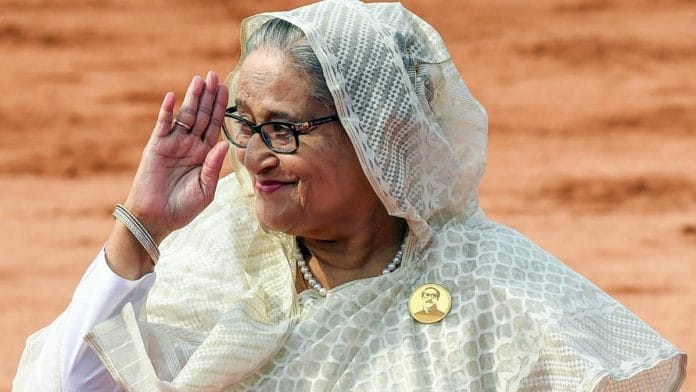New Delhi: Bangladesh Wednesday summoned India’s Deputy High Commissioner in Dhaka Pawan Badhe to protest over the interviews given by former Prime Minister Sheikh Hasina to Indian media houses.
The summoning came after Shafiqul Alam, the press secretary to Chief Adviser Muhammad Yunus called Indian journalists “bootlickers” for publishing Hasina’s email interviews in a post on the social media platform Facebook Tuesday.
Sources confirmed to ThePrint that Badhe was summoned over a raft of interviews Hasina gave to multiple media outlets last week. Despite Hasina giving interviews to multiple Western outlets, no other diplomat has been summoned by Dhaka yet.
“Western journalists and their Indian bootlicking counterparts aren’t even sure whether her responses come from Hasina herself or her PR handlers. Yet, they publish these so-called ’email interviews’ anyway—thanks to the millions spent to keep her narrative alive,” Shafiqul Alam, Press Secretary to Yunus said in a post Tuesday on the social media platform Facebook.
Alam, a former journalist, worked with Agence France-Presse (AFP), the French news agency. His former organisation had interviewed Hasina at the end of October. Other international outlets including Reuters, have all interviewed the former Prime Minister of Bangladesh.
The Press Club of India (PCI) in a statement Tuesday condemned Alam’s comments. It said the comments by the Press Secretary of Bangladesh were “reprehensible” and sought an apology.
“Such comments are entirely reprehensible, as Mr Alam is a former journalist. To describe professionals from responsible media outlets pursuing a genuine news story as bootlicking journalists is certainly not expected from a person in a responsible position,” the Press Club of India statement said.
The ex-Prime Minister of Bangladesh fled the country in August 2024 and has since been in India. Across her interviews she announced that supporters of her party—the Awami League—will likely boycott the upcoming elections in Bangladesh, scheduled for February 2026, while terming the ban on the party that led the country for 15 years a violation of the constitution.
According to BSS, a Bangladeshi news agency, Dhaka informed Badhe that “harbouring such a notorious fugitive currently under trial for committing crimes against humanity” and giving her space in the Indian media was “unhelpful” for bilateral ties.
In the aftermath of Hasina’s ouster, ties between India and the interim government in Bangladesh have soured. Muhammad Yunus, the interim leader has yet to be invited to visit India. Prime Minister Narendra Modi met Yunus on the margins of the BIMSTEC summit in Thailand earlier this year.
Dhaka has also put in place a number of measures such as extra checks on imports from India, which have added challenges to the relationship. India earlier this year further restricted transshipment rights of goods from Bangladesh, while also restricting ports that can handle Bangladeshi goods.
The Bangladeshi interim government requested Hasina’s extradition in December 2024, a request that India has confirmed it has received and its officials are looking into. However, the latest interviews by Hasina have angered Dhaka.
(Edited by Viny Mishra)
Also read: Don’t call student protests a revolution. It was a terror attack on Bangladesh: Sheikh Hasina






